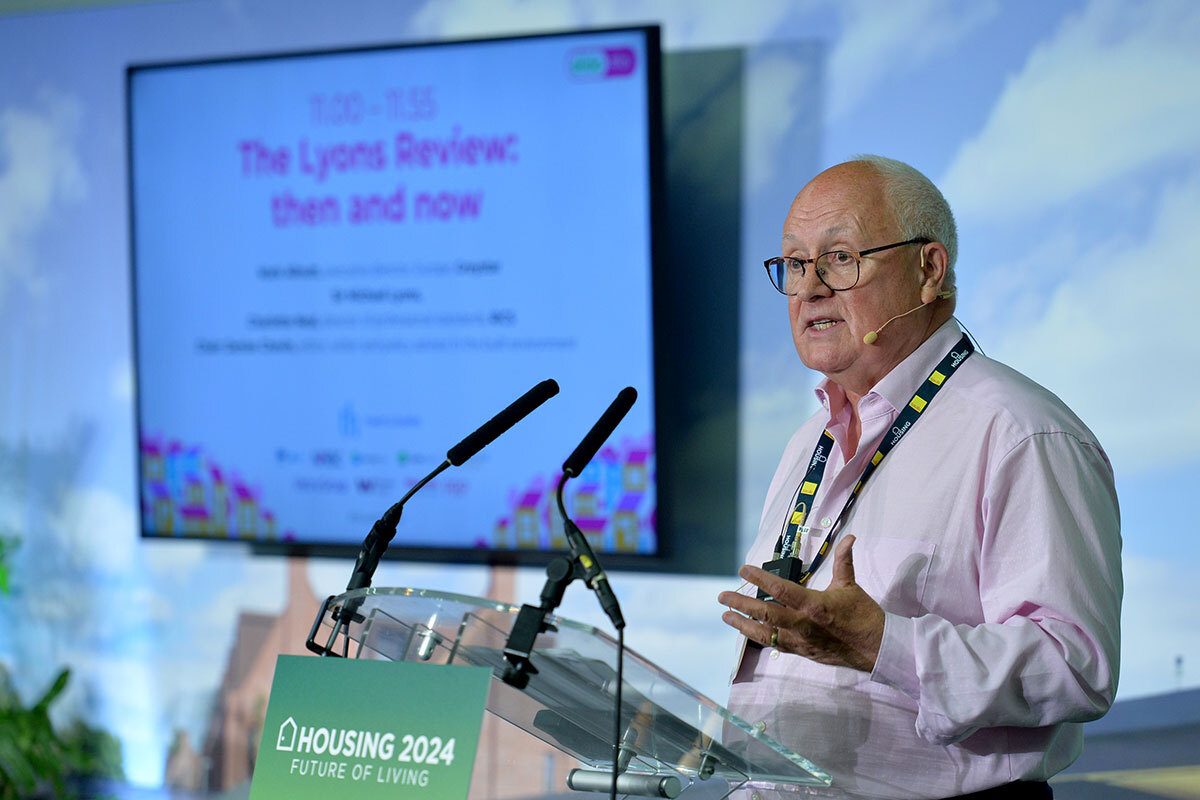You are viewing 1 of your 1 free articles
Dispatches from Housing 2024: day two
A daily round-up of the most important headlines from day two of the Housing 2024 conference. Photography by Guzelian
Day two dawned in Manchester with the news of Bromford and Flagship’s merger plans, in a move that would create a 79,000-home landlord, and talk of a new code of good practice for shared ownership.
Moving on from day one, during sessions and workshops at the conference centre, delegates heard how skills shortage were holding back fire safety efforts, the impact of Awaab’s Law, and how to practice good data management.
Adjacent to the hustle and bustle of the main hall, job seekers could speak to representatives from the sector about their potential employment opportunities.
Read on for all the key talking points from day two.
Skills shortages holding back fire safety efforts

The lack of engineers and scaffolders is holding back housing associations’ fire safety remediation efforts, the chief executive of L&Q said.
Fiona Fletcher-Smith said that for landlords to achieve their housebuilding ambitions, the next government would need to work across departments to address the skills shortage.
She said: “Even if I had all the money I need, I simply couldn’t get the right number of fire engineers or – the biggest shortage of labour in London – scaffolders. And if you’re dealing with towers above 18 metres, you need scaffolders.”
During the session, Ms Fletcher-Smith was speaking to Clive Betts, former chair of the Levelling Up, Housing and Communities (LUHC) Committee.
The long-standing MP, who is a Labour candidate in next month’s general election, said that modern methods of construction (MMC) could also help to address the industry’s skills shortage.
“There are [MMC] companies around… [but] “they haven’t really been supported and encouraged by government. There isn’t the overall strategy to actually take us forward on this,” Mr Betts said.
Awaab’s Law

A session on Awaab's Law attracted a significant crowd with standing room only. The law, named after Awaab Ishak, the two-year-old boy who died from prolonged exposure to mould in a housing association flat, was introduced as an amendment to the Social Housing (Regulation) Act last year. It will introduce strict timescales for social landlords to respond to hazards such as damp and mould.
The audience heard from Charlotte Todd, property director at Eastlight Community Homes, on what the landlord is doing around repairs.
She explained: “In terms of damp and mould, I’m sure you’ve all experienced significant changes such as Eastlight has. Pre the Awaab Ishak case, we had about 300/400 cases reported each year and we were spending about £80,000.
“Move forward to November 2022, [there was a] nearly 300% increase in cases.”
she added that costs to address damp and mould have increased to over £420,000.
Eastlight reviewed its response and approach over the months that followed. “We did a huge piece of work with our data in our systems. So to understand if there were links between certain property types and certain household make-ups and we didn’t find any links between any of that.
“The important thing for us was to understand the customer feedback that we have,” Ms Todd said.
The main thing was communication, she stated. “We needed to explain things better to customers.”
Ms Todd said the landlord also needed a better case-management system and to improve its website with more information.
She added: “Any case that requires follow-on work, they are assigned a customer liaison officer and about 30% of our cases end there.
“The remaining are where we really got to understand what the issue is more and again, we make sure that we’ve got a customer liaison officer assigned and that they’re got aftercare plans that are agreed. We know that we’re not always the experts.”
Eastlight also has monitoring devices fitted in homes to keep track of moisture levels and to know, for example, when residents cannot heat their homes.
Golden rules of data
Sessions on the importance of data attracted large crowds at Housing 2024.
One focused on the “golden rules” of good data management. Colin Sales, chief executive of 3C Consultants, kicked off the session with reference to the Housing Ombudsman’s Spotlight report on knowledge and information management.
Published last year, the report concluded that poor data and record-keeping is “ubiquitous” in the sector and that this was causing “daily detriment” to residents.
Mr Sales said the ombudsman’s staff has doubled to 300 in three years. “That’s a lot more responsiveness to a lot more complaints you could argue,” he said.
Mr Sales outlined the “golden rules” for good data management:
- Data is the new air
- Lead from the top
- Benchmark – “do not recreate the wheel”
- Create a vision and publish it
- Prioritise – “not all data has the same value”
- Automate and have an accountable person
- Clean up dirty data and get tools that stop it degrading in future
- Analytics gives insight into the quality of data
Culture transformation
“I can talk about lovely tools and technology, but culture change eats that technology for breakfast,” Mr Sales said.
He added that organisations should be telling everything that data is a key asset and if they see a problem, “don’t think it’s someone else’s”.
“Be sure you have one version of the truth,” he stated.
Another session that focused on data was called ‘turning insight into improvement’. During which, Jonathan Cox, director of data and business intelligence at Housemark, outlined the firm’s findings on tenant satisfaction measures.
He said the sector should be focused on gathering insight rather than just complying with regulation.
“What we’re really keen for people to do at Housemark is for you to use that data to generate insight. That’s what it’s really all about. So if you’ve got conversations going on at exec level or at board level about whether or not the figures are good or bad, that’s probably the wrong type of conversation.
“It’s what can we do with this – because this is phenomenal data that you’ve got there – to drive service improvement,” Mr Cox explained.
A nation of homeowners
A group representing developers, lawyers, lenders and housing providers met to discuss how to create a “nation of homeowners”. Following talk of mortgages and financial barriers for buyers, discussion turned to housebuilding.
Syreeta Robinson-Gayle, head of affordable housing at Barratt London, said the “lack of resources in the planning system and political changes” could add an extra year on to planning times, taking the wait up to three-and-a-half years.
“It is a waste of time and it is a waste of resources,” she stated.
Chris Carr, president of the Federation of Master Builders, said it was vital to be more imaginative with funding. “It would be simpler just to ask the government for buckets of cash, but I think we all know that’s not going to happen. Let’s try and be more creative in the way we deliver new houses for first-time buyers,” he explained.
Certainty around grant funding and levelling the playing field between for-profit and not-for-profit associations was raised by Anette Simpson, director of development and partnerships at Legal & General Affordable Homes.
“As a for-profit, we have to pay back levels of our grant if customers staircase, [which] not-for-profits don’t have to do – they’re able to recycle. It means that we have to put more risk into the investments we’re proposing to our investment company,” she said.
With a level playing field, Ms Simpson said “more investment would come into the sector”.
A generation betrayed
This failure to deliver on a nation of homeowners has left a generation “betrayed”, Sir Michael Lyons said, speaking a decade after the publication of his review of the sector.
Sir Michael, currently chair of the English Cities Fund, said the housing crisis is as “critical” today as it was 10 years ago.
“We know that when people are unable to access safe, secure homes, it can have terrible consequences for them and our whole society,” he said.
“Growing up in unstable and inadequate housing conditions will impact children’s health and educational attainment.”
Sir Michael added that his foreword for the review, which highlighted how just half the number of homes needed are built each year, could have been written today.
“Very worryingly, so many indicators show that the situation today is steadily worsening,” he said.
The Lyons Review called for the government after the 2015 general election to “establish homebuilding as a clear priority” and proposed a series of local and national recommendations, with the ultimate goal of seeing annual net growth of homes reach 200,000 homes by 2020.
“Could a new Labour government bring a sea change? I’d like to hope so,” Sir Michael said. “But like many others, I’ve been disappointed that neither increasing homebuilding nor pledging to build more social homes figured among Sir Keir Starmer’s highest priorities.”
Inside the jobs fair
John, a cladding draughtsman by trade, is old hat at job fairs by this point – he attended one on Wednesday and has plans for four more this week.
He said he is more than willing to re-skill for the right role, and social housing is attractive because of the growth. “We need social housing more than ever, so there will be lots of jobs,” he said.
Themes of personal development and investment in training came up frequently when speaking to attendees wandering around jobs fair at Housing 2024.
As Inside Housing’s Housing Hires campaign looks to promote careers in social housing, there seems to be a sense that the sector is a place to stay for the long term and grow within.
Many people also referenced the sector’s stability. Kwabena, who has experience as a data analyst and full stack engineer, said the average salaries are somewhat below what is available in the private sector, but that it is worth it for the job security.
Maureen Fitzmaurice, who works in talent acquisition at Riverside, echoes this. The housing association is expanding heavily in both trades and customer service but, like most of the sector, it is “squeezed” when it comes to competing on salary.
However in the current economic climate, Ms Fitzmaurice said the security is very attractive. “We’re not going anywhere,” she stated.
Sign up for our daily newsletter
Already have an account? Click here to manage your newsletters














